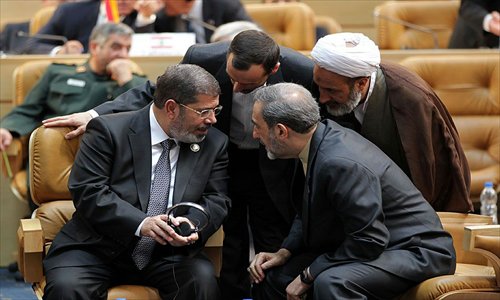Tehran summit roasted by criticism

Iran's supreme leader Ayatollah Ali Khamenei opened a two-day summit of the 120-member Non-Aligned Movement (NAM) on Thursday with a speech denying his country was seeking nuclear weapons, but its threats to destroy Israel and denial of the Holocaust drew fire from UN chief Ban Ki-moon.
Iran, hosting the NAM summit, is hoping the high-profile event will prove that Western efforts to isolate it and punish it economically for its disputed nuclear program have failed.
In his speech, Khamenei blasted the US as a hegemonic meddler and Israel as a regime of "Zionist wolves."
He also stated that his country "is never seeking nuclear weapons" and accused the UN Security Council, under US influence, of exerting an "overt dictatorship" over the world.
Ban, who looked irritated at Khamenei's remarks, shot back that Iran should boost global confidence in its nuclear activities by "fully complying with the relevant (UN) Security Council resolutions and thoroughly cooperating with the IAEA," the UN's nuclear watchdog.
"I strongly reject threats by any member state to destroy another or outrageous attempts to deny historical facts such as the Holocaust," Ban said in his speech.
He warned about the current state of bellicose rhetoric coming from Israel and Iran, saying "a war of words can quickly spiral into a war of violence."
Egypt's new President Mohamed Morsi - making the first visit to Iran by an Egyptian head of state since the 1979 Islamic revolution - in turn embarrassed his hosts by voicing support for the opposition in Syria, which is fighting the Damascus regime unwaveringly backed by Iran.
"Our solidarity with the struggle of Syrians against an oppressive regime that has lost its legitimacy is an ethical duty, and a political and strategic necessity," Morsi said in his speech.
Morsi's address prompted a walkout by the Syrian government delegation and drew a sharp response from Syria's Foreign Minister Walid Muallem, who accused the Egyptian leader of inciting further bloodshed in Syria.
Iranian President Mahmoud Ahmadinejad and Morsi discussed the Syrian conflict and their states' severed diplomatic ties in their first-ever bilateral meeting later on Thursday.
Morsi left Tehran shortly after the meeting, Iranian media reported.
Iran has been reaching out to Morsi since June when he became Egypt's civilian president.
Separately, the IAEA said on Thursday in its latest quarterly report that Iran has since May more than doubled the number of centrifuges installed at its Fordo nuclear facility dug into a mountain, many more than expected, and that "extensive activities" at Iran's Parchin military complex would hamper its investigation there.